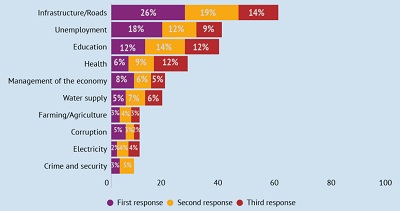
Roads topmost priority for Ghanaians
Road infrastructural developments are the most pressing need that Ghanaians want the government to immediately address.
For the first time since 2002, road infrastructure topped the list of citizens’ priority needs, beating unemployment, which had dominated the list in all those years.
According to the report, six in 10 Ghanaians, or 59 per cent, said roads were the topmost of the three priority areas they wanted the government to immediately address.
Optimism
A new Afrobarometer survey conducted by the Centre for Democratic Development (CDD) also indicated that more than half of the respondents (54 per cent) were optimistic that things would be “better” or “much better” in 12 months’ time.
In contrast, approval ratings of the government’s economic performance sharply declined among Ghanaians, compared to the 2017 ratings.
Six in 10 Ghanaians (59 per cent) said the country was “going in the wrong direction”.
The share of citizens who see the country as “going in the right direction” also declined by 15 percentage points to 35 per cent.
More findings
These were part of the findings in the latest CDD Afrobarometer survey, with a sample size of 2,400, which was conducted in all the 16 regions of the country from September 16 to October 3, this year.
Presenting the findings of the report in Accra last Wednesday, the Afrobarometer Communications Coordinator at the CDD, Ms Josephine Appiah-Nyamekye Sanny, said aside from roads, unemployment was the next most frequently cited problem, as 39 per cent of the respondents cited it.
That was followed by education, with 38 per cent, and health, with 27 per cent.
“A sample of this size yields country-level results with a margin of error of plus or minus (+/-) two percentage points at a 95 per cent confidence level,” she said.
Regional rankings
The citizens’ ranking of their most important problems was fairly consistent, regardless of respondents’ region, age or urban-rural location, but the groups’ relative emphasis on the problems varied, the report pointed out.
Concerns over roads were highest in three of the newly created regions — Bono East, Oti and North East — and lowest in Greater Accra and Upper East.
Older people and rural residents placed a higher premium on infrastructure and roads, while the youth and urbanites prioritised unemployment, it said.
The survey also showed that only a few Ghanaians said the government had done “a lot” or “somewhat” in addressing their most important problems since it assumed office in January 2017.
Budget
In the last few months, agitations have been rife in parts of the country, with intermittent protests against poor roads.
Some of the notable areas are Santor and Nanakrom, Teshie-LEKMA, Ablekuma-Manhean-Afuaman, all in Accra; Ashaiman; New York, Washington and Atadeka in the Kpone-Katamanso District; Swedru in the Central Region; Ho, Kpeve, Gbi and Battor in the Volta Region, and Samraboi in the Amenfi West District in the Western Region.
Government’s commitment
The government has expressed its commitment to tackle the roads and went ahead to declare next year as “The Year of Roads”.
The 2020 Budget has earmarked GH¢9.3 billion for road infrastructural projects, with President Nana Addo Dankwa Akufo-Addo and Vice-President Mahamudu Bawumia cutting the sod for some road projects in parts of the country, mainly under the $2-billion Sinohydro project.
The survey findings are expected to inform Parliament and citizens’ scrutiny and monitoring of the government’s disbursement of funds allocated for infrastructural projects to ensure that citizens’ aspirations are met.
Economic management
According to the survey, few citizens were content with the country’s economic situation and their personal living conditions, with majority of them saying the country was headed in the wrong direction.
More than half of the respondents were optimistic that things would get better in a year’s time and that Ghana had received positive reviews from the International Monetary
Fund (IMF) and the World Bank as having made important economic strides, including the successful completion of the IMF bailout programme and a clean-up of the financial sector.
But so far these successes appeared not to have translated into concrete gains recognised by most citizens, the report pointed out.
In the findings, only three in 10 Ghanaians (30 per cent) described the country’s economic conditions as “fairly good” or “very good”, a modest decline from 35 per cent recorded in 2017.
Fewer than four in 10 respondents (37 per cent) said their personal living conditions were “fairly good” or “very good”.
Thirty one per cent said the country’s economic conditions had improved over the past 12 months.
Income gap
Majority of citizens (66 per cent) said the government was performing “fairly badly” or “very badly” in narrowing income gaps.
Fifty six per cent said the government was performing poorly on improving the living standards of the poor, while 54 per cent said the government was performing fairly badly in creating jobs.
Approval ratings on indicators of the government’s economic performance declined sharply, compared to 2017, with approval on the management of the economy recording the steepest drop of 20 percentage points, the results of the survey indicated.
